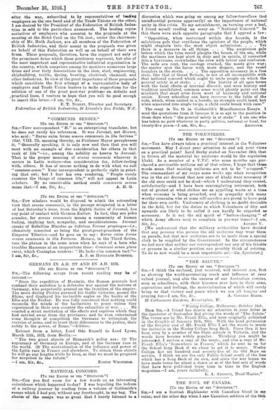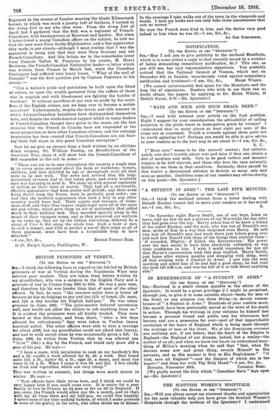Regiment in the streets of London wearing the khaki Kilmarnock
bonnet, in which was stuck a jaunty tuft of feathers, I turned to the Army List to see who they were. From the Army List of April last I gathered that the 85th was a regiment of Preach- es= diens, with headquarters at Montreal and Quebec. But when I interviewed a young Canadian officer on the subject, he told me that the men were Nova Scotia Highlanders: and a fine appearance they made in our streets—although I must confess that I was dis- appointed in being told that they were Nova Scotians and not French-Canadians. And this brings me to the remarkable letter from Captain Talbot M. Papineau to his cousin, M. Henri Bourassa, the French-Canadian Nationalist leader—a letter which was written from France in March last, when the Canadian Contingent had suffered very heavy losses. " What of the soul of Canada? " was the first question put by Captain Papineau to his cousin :-
" Can a nation's pride and patriotism be built upon the blood of others, or upon the wealth garnered from the coffers of those who in anguish and with blood-sweat are fighting the battles of freedom? If without sacrifices of our own we profit by the sacri- fices of the English citizen, can we hope ever to become a nation oui Lobes? Unfortunately, despite the heroic and able manner in which French-Canadian battalions have distinguished themselves here, and despite the whole-hearted support which so many leaders of French-Canadian thought have given to the cause, yet the fact remains that the French in Canada have not responded in the same proportion as have other Canadian citizens, and the unhappy impression has been created that French-Canadians are not bear- ing their full share in this great Canadian enterprise."
Now let me give an extract from a book written by an old-time Army surgeon, Dr. William Dunlop, on Recollections of the American War, since it will show how the French-Canadians of 1813 responded to the call to arms:—
"There was not to be seen throughout the country a single man it to carry arms occupied about his farm or workshop; women, children, and men disabled by age or decrepitude were all that were to be met with. The news had arrived that the long- threatened invasion had at last taken place, and every available man was hurrying to meet it. We came up with several regiments of militia on their lines of march. They had all a serviceable, effective appearance—had been pretty well drilled; and their arms being direct from the Tower, were in perfectly good order ; nor had they the mobbish appearance that such a levy in any other country would have had. Their capots and trousers of home- spun stuff, and their blue tuques (night-caps) were all of the same cut and colour, which gave them an air of uniformity that added much to their military look. They marched merrily along to the music of their voyageur songs, and as they perceived our uniform as we came up, they set up the Indian war-whoop, followed by a shout of Vive le Roi along the whole line. Such a body of men in such a temper, and with so perfect a use of their arms as all of them possessed, must have been a formidable body to have attacked."



































 Previous page
Previous page